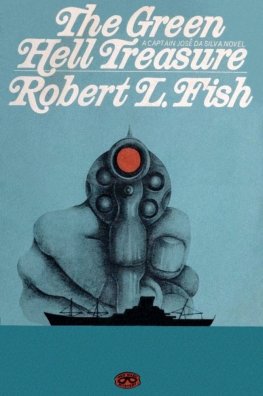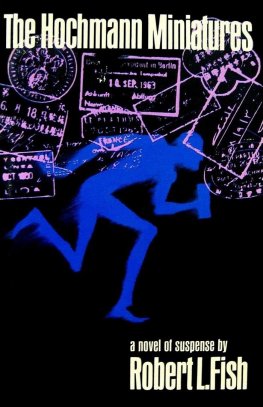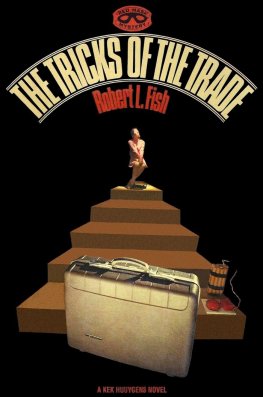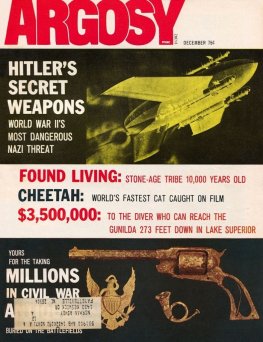Robert L. Fish
The Green Hell Treasure
This book is dedicated
with total admiration
to the most important friend and helper
the mystery writer ever had:
WILLIAM A. P. WHITE
known to his millions of friends
and fans as
TONY BOUCHER
Pre-Lenten Carnival in Bridgetown, Barbados, easternmost of the Lesser Antilles, with the SS Porto Alegre of Brazilian registry anchored out in the wide roadstead, swaying slightly in the wash of a lesser draft Panamanian freighter seeking a berth closer to land. Evening coming on with tropical swiftness, a smattering of stars beginning to pierce the velvet fabric of the sky, and the majority of the crew and passengers of the cruise ship already ashore by lighter, chaperoned by cruise director and directoress and intent upon escape, enjoying the heady sensation of distant places, the rich warmth of the Caribbean night, the gay costumes, the dancing in the streets, the hysteria not the mad abandon of Rio de Janeiro, but still Carnival the rum drinks thrust upon one from all sides, the beautiful women again not Rio, but still...
Orange-red sun sinking fast in the west, a huge balloon being tugged from somewhere below the edge of the world into the darkening ocean; one expected a hiss as it went under, a sudden jetting of steam, but instead it merely flooded the ruffled surface with a shimmering carpet of gold from the ship to the horizon. Bridgetown proper on the ships starboard side to the east, lights beginning to flicker from the city poles planted before the low concrete-block warehouses at waters edge, from Trafalgar Square visible behind a battery of fishing trawlers and yachts rocking at dockside before Nelsons monument, their kerosene lanterns swinging on gimbals beside cabin hatchways or high on swaying crosstrees, brighter lights from the white buildings along Broad Street with their own generators, or from the verandaed homes hiding behind the thick stands of flamboyant and tamarind and casuarina trees on the low rolling slopes of the city. And the faint sound of raised voices chanting in the distance and music coming rhythmically over the choppy waves to the anchored ship.
A sound at the foot of the gangplank angled steeply down the side of the Porto Alegre, hugging the steel plates as if for protection, leading from the promenade deck to the small attached floating platform used to transfer passengers or crew to the lighter whenever it deigned to arrive, a dubious thing during Carnival. A call from below in a deep voice.
Hey, mon! Up on deck!
The deck officer stared down the shadowed side of the vessel, a sheer cliff pierced by portholes, seeing the bobbing rowboat at the foot of the gangplank and the four men half-standing, balancing themselves expertly, steel drums of various sizes dangling from their necks by frayed ropes, the lights from the cabin portholes beginning to strengthen in the darkening night, washing the water of the roadstead green-yellow against the black of the shadows.
Yes? The deck officer, together with most of the upper echelon of the ships personnel, spoke what he considered fair English. It was essential; a large portion of the cruise passengers each trip were from the United States.
Oh, mon! How you like some real island steel drum up there on that deck, eh, mon? Good music, sir. The best. A hand over the heart, not wavering in the slightest despite the bouncing of the small boat. A wide smile. His three companions silent, watching. Believe me, sir. My word!
The deck officer grinned down at the histrionics beneath him and then shook his head. He was young, neat in his almost-new uniform, his naval cap with its braid cocked nonchalantly over a nautical crew cut, and he knew the book from cover to cover. Except, of course, the proper angle for a young officer to wear his cap. But the captain was ashore with all the rest.
Regretful, boys. Cant be had.
Oh, mon! Good music, sir! There was the slightest touch of reproval in the deep voice, sorrow that the young deck officer should be so bound by rules, especially during Carnival when everybody knew there were no rules. Particularly, one would have thought, a Brazilian. Best music on the island of Barbados, sir. My word on it.
The deck officer fought down a grin. Yet against the regras, I fear me. No pode ser. I regret.
At the young officers side the assistant chief engineer, a Scot not much older than the deck officer, but ages older in experience. Fear of rules together with most other fears was something he had lost in His Majestys Navy, being in the water several times in the course of his service, once for six hours before being picked up. Not as far back as one might think; these things can happen when you go before the mast as oilers assistant at the age of fourteen, but still better than the Lochgelly coal mines. He had seen service in the ships of at least five nations since then, never staying too long on any one. He had volunteered to stay aboard tonight in favor of the Brazilian members of the engine-room staff going ashore; Carnival meant a lot to them.
He glanced calmly at the young deck officer at his side, not too well acquainted with him, bit down on the thin black cigar he had become accustomed to when cigarettes were hard to come by at home, and squirted smoke past stained teeth, speaking around the edge of the Havana. It was not the best Havana, but it had been rolled in Cuba. Like me, once, he thought with a sour inward smile, and spoke up.
Ah, mon, let the buggers come up! he said dispassionately. Whats the odds? Its Carnival a big thing in these islands. Almost as big as it is down Rio way. He removed the cigar, contemplated it a moment, licked a recalcitrant leaf back into place, checked his handiwork for relative permanence, and replaced it in his mouth. He clamped his teeth on it, prepared once again for speech. They wont steal the ruddy boilers on this tub, he said sardonically, and it wouldnt hurt a hell of a lot if they did.
This was mostly rhetoric; the Porto Alegre was less than ten years out of the builders slip and had excellent boilers. In any event the deck officer understood only about half of his companions plea, but he did get the general drift.
Come on, Scotty. You know the rules. He spoke in Portuguese.
In the darkness below, the four waited quietly, bouncing on the choppy waves. One hand of the largest of the four was now gripping the rope that served as a fragile railing for the rolling dock at the foot of the angled ladder; his attitude was one of anticipation, sensing rather than actually hearing the discussion above, wisely allowing the white man to argue for them. Across the roadstead a rusted freighter swung at anchor; from the taffrail a man in a greasy apron watched the performance even as he dumped garbage into the sea.
I know the rules, the engineer said, returning to English, and smiled grimly out into the darkness. Too bloody well I know the rules. Made to be broke, the whole frigging lot.
Eu no posso. I cant not.
Damn it, mon, of course you can do it. Youre the deck officer at the moment, arent you? He snorted. A couple of youngsters banging around the deck on some tin drums for a couple of minutes trying to pick up some change. What the bleedin hell! If they was provisioners from Cave, Shepherd, with a couple of cases of decent brandy for the old man, he added significantly, theyd be aboard fast enough. If we had to send a gang to carry them, drums and all!
The uniformed officer at his side grinned.
Ta bom. All right, Scotty. Do not have an attack of the heart over it. He moved to the section of railing that had been removed from the promenade deck, allowing access to the unstable gangway, leaning over, raising his voice, speaking slowly to clarify his enunciation. All right,
















